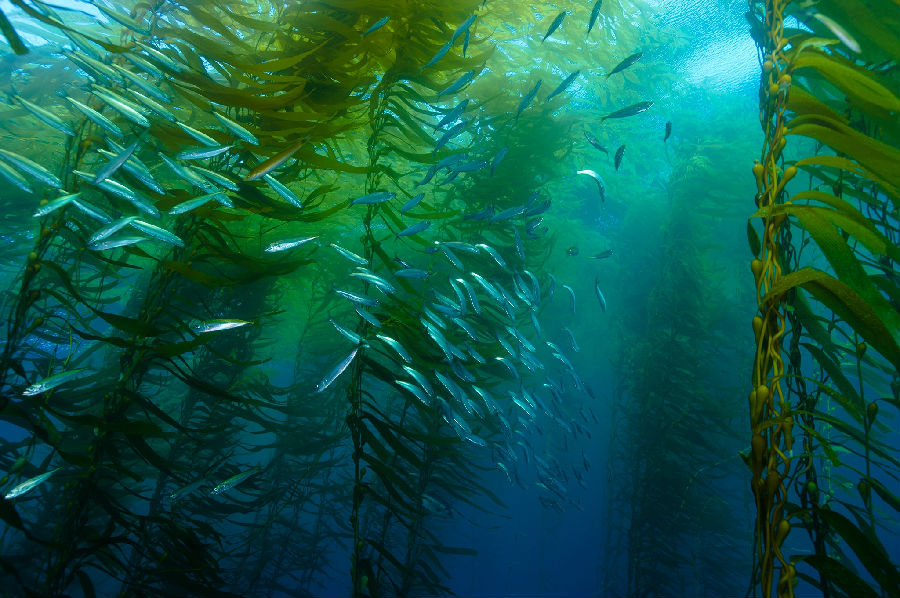Duarte and Roberts have co-written a sweeping new study published in the journal Nature
杜阿爾特和羅伯茨二人還合力開展了一項意義深遠,現已發表在《自然》上的研究,
that offers a blueprint for how the ocean might be restored within a generation.
描繪了一幅人類在一代人的時間之內恢復海洋生態的藍圖。
The proposed measures would cost billions of dollars a year,
研究中提議的各項舉措年耗資就將高達數十億美元,
but the return on investment would be 10 times as high in increased biodiversity, fish stocks, jobs and tourism revenue, says Roberts.
但羅伯茨表示,這一投資將在豐富生物多樣性、魚類資源、就業和旅游收入等方面帶來十倍于投入的回報。
"We have seen over and over again that given a chance, ocean life can come back.
“我們已經一次又一次地看到,只要有機會,海洋就能重新煥發生機。
We just have to be willing to give it time to heal.”
我們只需要有給它時間療傷的意愿就夠了。”
A revitalized ocean would not only feed a growing population but could also strengthen our fight against climate change.
海洋恢復活力之后不僅能供養更多的人口,還能為我們抗爭氣候變化添磚加瓦。
Coastal habitats such as mangroves and salt marshes are extraordinary carbon sinks,
紅樹林、鹽沼地等濱海生態都是碳匯明星,
sequestering as much CO2 per acre as 16 acres of pristine Amazonian rain forest.
一英畝的碳儲量就相當于16英畝原始亞馬遜熱帶雨林的碳儲量。
New developments in offshore wind-farm technology can provide an inexhaustible supply of green energy,
海上風電技術的發展能提供取之不盡的綠色能源,
while mineral deposits on the seafloor, if mined sustainably, offer the raw ingredients for the batteries to store it.
而海底的礦藏,進行可持續開采的條件下,能為儲存風能的電池提供原材料。
"It’s time to stop thinking of the ocean as a victim of climate change and start thinking of it as a powerful part of the solution,”
"我們是時候停止將海洋視為氣候變化的受害者了,我們應該開始將海洋視為解決氣候問題的有力武器,”
says Jane Lubchenco, a marine ecologist who served as head of the National Oceanic and Atmospheric Administration (NOAA) under President Barack Obama.
曾在奧巴馬任內擔任國家海洋和大氣管理局(NOAA)局長的海洋生態學家簡·盧布琴科說道。
When the coronavirus pandemic forced the global economy into a state of suspended animation,
新冠病毒大流行迫使全球經濟進入停滯狀態后,
carbon emissions slowed, shipping idled, and fisheries closed.
碳排放速度放緩了,航運停頓了,漁業也停止了。
The ocean was allowed a moment to breathe.
海洋終于有了片刻的喘息之機。
The pause was short-lived, of course, and the economic cost potentially catastrophic.
當然,這種停頓只是暫時的,停頓或將讓我們的經濟付出災難性的代價。

But, like the once unimaginable sight of blue skies over industrial areas,
重要的是,就像工業時代人們難以想象還能見到藍天白云一樣,
it offered a reminder that change is within our grasp.
這一停頓也在提醒著我們,改變就在我們力所能及的范圍之內。
"The coronavirus crisis has shown us when there is a threat to the global population,
“新冠病毒危機已經向我們表明,只要全人類面臨威脅了,
there is a willingness to act collectively to limit that threat,” says Roberts.
大家就會愿意眾志成城,一起控制這種威脅,”羅伯茨說。
The tough lessons of COVID-19 may yet translate into a stronger understanding
新冠疫情的慘痛教訓或許會內化成我們
of the inter-connectedness of our personal and planetary health—and a demand for action.
對個人健康與地球健康的密切相關——以及對行動的渴望——更深刻的認知。
The stakes for ocean health have never been higher.
海洋從未像現在這樣面臨過如此高的健康風險。
The dying kelp and disappearing coral reefs should be sounding an urgent alarm, says Christopher Trisos,
如今已經陷入生死邊緣的海藻和正在消失的珊瑚礁就足以給我們敲響警鐘了,
a senior researcher at the African Climate and Development Initiative at the University of Cape Town
專注于氣候變化、生物多樣性和人類福祉的跨學科研究的
who focuses on the intersection of climate change, biodiversity and human well-being.
開普敦大學非洲氣候與發展倡議高級研究員克里斯托弗·特里索斯說道。
"Bio diversity loss from climate change looks like a trickle right now, but it could become a flood very quickly,” he says.
“就現在來看,氣候變化對生物多樣性的損害不過是涓涓細流般的影響,但它很快就能變得像洪水猛獸一樣,”他說。
譯文由可可原創,僅供學習交流使用,未經許可請勿轉載。











